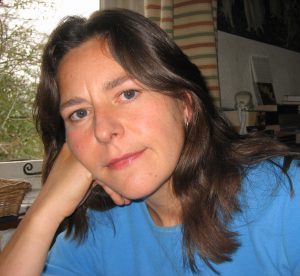
Translator
Antonia Lloyd-Jones is a full-time translator of Polish literature, and twice winner of the Found in Translation award. She has translated works by several of Poland’s leading contemporary novelists including Olga Tokarczuk and Jacek Dehnel, and authors of reportage including Mariusz Szczygieł and Artur Domosławski. She also translates crime fiction by Zygmunt Miłoszewski, poetry, essays, and books for children, including work by Aleksandra and Daniel Mizieliński. She is a mentor for the Emerging Translators’ Mentorship Programme and co-chair of the UK Translators Association.
Tell us what you do in 20 words or fewer?
I translate Polish literature into English, promote Polish books to English-language publishers and readers, and mentor emerging translators.
You have been instrumental in this year’s London Book Fair Polish Market Focus. How did you first get hooked on Polish literature and culture?
I studied Russian in the Soviet era, and first went to Poland in 1983, during the period of martial law imposed to clamp down on the new social and political freedom introduced in the Solidarity era. My friends there were involved in the fight against the oppression of freedom of expression, and I wanted to help them. So I started learning the language, aiming to report on Poland as a journalist, but found the literature so fascinating that I soon decided my role was to translate and promote modern Poland and its culture to Western readers in that way.
What is it that you think sets the Polish literary scene apart from the rest and makes it unique?
Thanks to Poland’s complex history – once the biggest country in Europe, then wiped off the map by the neighbouring empires, then after only 20 years of independence ravaged by invasion and occupation during the Second World War when it lost six million citizens – much of its literature is self-referential, exploring and coming to terms with these painful experiences. But this is a nation with plenty of stories to tell, not just about its tribulations. Poland has a long poetry tradition, producing two past winners of the Nobel Prize for Literature, namely Czesław Miłosz and Wisława Szymborska, whose spirits remain very much alive. In the post-communist era, literature has flourished, with several genres taking off in a big way, notably literary reportage – a branch founded by Ryszard Kapuściński, world-famous for his books on Haile Selassie and the Shah of Iran – and children’s illustrated books, which also have their roots in a strong tradition that goes back several decades. Poland has always produced superb science fiction – the famous name here is Stanisław Lem, author of Solaris, who used the genre to write allegorically in an era of censorship. The writers appearing at LBF are worthy successors to these widely translated authors.
Who is the contemporary Polish writer that most excites you?
Jacek Dehnel, who at only 36 has already published five poetry collections and ten works of prose, including four novels. I’m now translating his first novel, Lala, written when he was only 20, which is the story of his grandmother’s life as she told it to him, in a series of anecdotes. It gives us a portrait of intelligentsia life in Poland that is often comical and often moving, and the writing is exquisite. He’ll be talking about this novel at the PEN Salon. His novels are diverse, erudite and powerfully written. His second novel, available in English, is Saturn (published by Dedalus, 2012), based on the life of Francisco Goya, and depicting the painful relationship between a father and son. His third, Mother Makryna, tells the true story of a 19th-century fraudster who claimed to be an oppressed Catholic nun. His most recent novel, Krivoklat is the monologue of a lunatic compelled to destroy great works of art. This year Zephyr Press will publish Apertures, a collection of Dehnel’s poetry, translated by Karen Kovacik.
What are you looking forward to most of all at this year’s Poland Market Focus programme?
Olga Tokarczuk as Author of the Day on Wednesday 15 March. Tokarczuk is a versatile and prolific novelist whose work deserves to be well-known to the English-speaking world. This year, her novel Flights will be published by Fitzcarraldo Editions (translated by Jennifer Croft), and I sincerely hope more of her books will soon follow. She’s not just a great story-teller and a very inventive writer, but a charming person whose public appearances are always a joy. I’m thrilled that at LBF a whole new audience will learn about this intriguing and very readable author.
Now here’s a challenge. Often people struggle with the pronunciation of Polish words and names. Can you phonetically spell the names of all the Polish authors attending LBF this year?
What challenge? Here’s my handy guide:
| Name | Pronunciation | Helpful hints |
| Artur Domosławski | AR-tour Domos-WAV-ski
The stress is on AR, then on WAV |
AR as in artist, TOUR as in tourist; DOMOS – short o’s as in colony, WAV to rhyme with have, SKI as in ski-ing. |
| Jacek Dukaj | YAT-sek DOOK-ay
The stress is on YAT, then on DOOK |
YAT to rhyme with cat, SEK as in sector; DOOK to rhyme with book, AY as in Aye Aye Captain! |
| Marta Ignerska | Ig-NER-ska
The stress is on NER |
IG as in big, NER are in ne’er-do-well, SKA as in whisker. |
| Dariusz Karłowicz | DARry-oosh Car-WOV-itch
The stress is on DAR, then on WOV |
DARRY to rhyme with Harry, OOSH as in push; CAR as in car, WOV to rhyme with novel, ITCH as in itch. |
| Zygmunt Miłoszewski | ZIG-moont Me-wash-EFF-ski
The stress is on ZIG, then on EFF |
ZIG as in Ziggy, MOONT to rhyme with German und; ME as in me myself, WASH as in wash, EFF as in the letter F, and SKI as in ski-ing. |
| Aleksandra Mizielińska | Me-zhe-LIN-ska
The stress is on LIN |
ME as in me myself, ZHE as in French Gérard, Général, LIN as in Linda, SKA as in Whisker. |
| Daniel Mizieliński | Me-zhe-LIN-ski
The stress is on LIN |
ME as in me myself, ZHE as in French Gérard, LIN as in Linda, SKI as in skiing. |
| Andrzej Nowak | AND-zhay NOV-ak
The stress is on AND, then on NOV |
AND as in and, ZHAY sounds like French j’ai; NOV as in novel, AK as in act. |
| Olga Tokarczuk | Tok-ARCH-ook
The stress is on ARCH |
TOK as in tick-tock, ARCH as in arch, OOK to rhyme with book. |
| Ewa Winnicka | EV-er Vin-IT-ska
The stress is on EV, then on IT |
EWA sounds like ever; VIN as in vintage, IT as in it, SKA as in whisker. |
If you could recommend three Polish books British people should read what would they be?
That really is a challenge – there are so many great books. I’m going to narrow it down to novels by authors appearing at LBF or within the week of the book fair, available in English translation and on sale at the Book Fair.
Entanglement by Zygmunt Miłoszewski (Bitter Lemon, 2010): This is a page-turning crime novel with a difference – set in modern Warsaw, it flashes back to communist-era Poland because the central murder has its roots in the past when the secret police assassinated its enemies with impunity. And the truth underlying the novel is that many past crimes committed by the secret police really have gone unpunished.
Swallowing Mercury by Wioletta Greg (translated by Eliza Marciniak, Portobello 2017): A lyrical account of a girl’s 1980s childhood and adolescence in southern Poland. Strongly autobiographical, this beautiful book takes you into the magical, sometimes unsettling world of a remote village that has changed out of recognition in the intervening years. The author also writes poetry, which comes through in this excellent translation.
Primeval and Other Times by Olga Tokarczuk (Twisted Spoon, 2010): Using the convention of myth and magic realism, this novel tells the fictional 20th-century history of Primeval, a village “at the centre of Europe”. It makes highly success use of an innovative construction, where each section is “The Time…” of a character – not just people, but ghosts, animals, and God – or a man-made object, including a coffee grinder and a board game. These sections build up a detailed story of a family’s destiny.
What has been your most successful piece of business, or contact made, at LBF?
About 15 years ago, I met Polish publisher Beata Stasińska at the London Book Fair. As founder and head of the independent publishing house Wydawnictwo WAB, she launched the careers of many of Poland’s best contemporary writers – including Zygmunt Miłoszewski and Jacek Dehnel. These days, Wydawnictwo WAB is part of the larger Foksal company, and Beata has moved on to start up a literary agency for books and movies. Few people know Polish literature as well as she does, and she has often recommended books to me that have gone on to be published in English. I’m looking forward to seeing her this year.
What was the last book you read?
Heart of Darkness by Joseph Conrad, but in the superb graphic novel version, with text adapted by David Zane Mairowitz and illustrations by Catherine Anyango Grünewald. It’s a stunning achievement, retaining all the power and terror of the original. Catherine will be talking about her work on the book at a seminar on “Translating Conrad” at the Literary Translation Centre (Wednesday 15 March, 13.00-14.00).
What’s next on your reading list?
I’ve just started reading Egypt: Haram Halal by Piotr Ibrahim Kalwas, a warts-and-all portrait of modern Egypt by a Polish author who lives in Alexandria. His observations and conversations with Egyptians show a society that’s troubled and disturbing, but he clearly loves the place and the people. So far it is a fine example of the Polish tradition of reportage that tells the facts from the ground up, through the experiences and views of the man (and woman) in the street.

